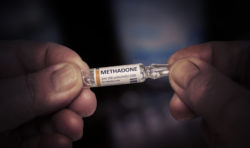Everything You Need to Consider When Adding Methadone to Your Treatment Plan

Overcoming an opioid addiction can feel like an impossible feat. While the journey will surely have its challenges, with the right treatment there is hope to take back control from an addiction. With Methadone, freedom might be closer than you think.
What is Methadone?
Methadone is a medication used in the treatment of opioid use disorder. It is administered with a prescription in a licensed facility and can help reduce opioid withdrawal symptoms and decrease cravings during recovery. Methadone is approved by the U.S. Food and Drug Administration and can help those struggling with opioid use disorder to take back control of their lives and break free from substance addiction. Methadone alone cannot resolve an opioid addiction, and medication-assisted treatment should always be combined with psychotherapy.
According to the American Society of Health-System Pharmacologists, detox using Methadone can take around a month to complete, but may be stretched out over several months as well. The effect of a single dose may onset quickly, and last for around six hours. Methadone can be taken orally or very rarely by injection.
How does Methadone Work?
Methadone is a synthetic opioid agonist, meaning it mimics a neurotransmitter. Methadone is effective because it blocks opioid receptors and replicates the effects without the severity of the damage that other opioids have. Essentially, Methadone can block the high you would feel from heroin, fentanyl or other opioids. For this reason, using Methadone as a part of your addiction treatment is often called replacement therapy.
While Methadone can surely help you get clean from opioids, it can also be dangerous when unsupervised. Sometimes, a dependency on the drug can develop. Ensure that you are only taking Methadone according to your doctor’s orders. If you start to notice negative effects of taking the medication or feel that you are unable to stop taking the medication, talk to your healthcare provider immediately.
There are generally two ways to add Methadone to your opioid use disorder treatment. The first is for short-term relief, typically in detox programs (and it takes under a month to complete). The second is for recovery maintenance and is prescribed over the long term. While administration of Methadone usually happens in a closely monitored and regulated facility, for some individuals who require medication to stay away from opioids in the long-term, Methadone can be taken at home.
What are Methadone benefits?
Decreases the likelihood of relapse: perhaps the best benefit of using Methadone for your treatment is that it can reduce your risk of relapse by reducing cravings and helping you manage the pain of detox. Sadly, relapse rates for opioid use are high, as high as 91 percent according to the American Addiction Centers. Safeguarding your recovery against relapse with medication-assisted treatment could be the game changer in making sure sobriety sticks.
Backed by science: A meta-analysis published in the Cochrane Library proves that Methadone is an effective intervention in the treatment of opioid addiction and can help to retain patient participation in treatment and decrease the frequency of heroin use. Compared to control groups of individuals who did not use medication-assisted treatment, Methadone provided better outcomes for patients.
Slow transition: One of the perks of having Methadone as part of your addiction treatment is that you’ll be able to slowly transition to no substances. Many professionals advocate for a year of treatment with Methadone after an opioid dependence, and a gradual tapering off of Methadone to avoid withdrawal symptoms and cravings. Carefully transitioning can help you learn to manage distress and cravings a little at a time, while still having the full support of your treatment team.
Extremely low risk of overdose: Using Methadone is much better than remaining in an opioid addiction. Overdose for heroin or other opioids is often lethal. Methadone is a much safer substance and on its own is unlikely to result in death if too much is consumed.
Return to your normal life: There are some serious consequences of opioid addiction that can be avoided by participating in medication-assisted treatment. Heroin and other opioids are extremely expensive and can cause cognitive and social dysfunction. Moreover, Methadone does not pose a risk of contracting health problems related to injecting drugs, like HIV and hepatitis.
When you’re in the midst of an opioid addiction, it can feel like you’ll never get your normal life back. Methadone makes freedom from drugs possible, and you can take advantage of it today.
Using medication-assisted treatment for addiction recovery
At Pyramid Healthcare, you’ll have every tool to enhance your recovery at your disposal. Compassionate professionals, state of the art facilities, award winning services and medication-assisted treatment can get you where you want to be in your journey toward sobriety. Get the confidential help you need by calling 888-694-9996. Don’t wait, take back control of your future today.
Overcoming an opioid addiction can feel like an impossible feat. While the journey will surely have its challenges, with the right treatment there is hope to take back control from an addiction. With Methadone, freedom might be closer than you think.
What is Methadone?
Methadone is a medication used in the treatment of opioid use disorder. It is administered with a prescription in a licensed facility and can help reduce opioid withdrawal symptoms and decrease cravings during recovery. Methadone is approved by the U.S. Food and Drug Administration and can help those struggling with opioid use disorder to take back control of their lives and break free from substance addiction. Methadone alone cannot resolve an opioid addiction, and medication-assisted treatment should always be combined with psychotherapy.
According to the American Society of Health-System Pharmacologists, detox using Methadone can take around a month to complete, but may be stretched out over several months as well. The effect of a single dose may onset quickly, and last for around six hours. Methadone can be taken orally or very rarely by injection.
How does Methadone Work?
Methadone is a synthetic opioid agonist, meaning it mimics a neurotransmitter. Methadone is effective because it blocks opioid receptors and replicates the effects without the severity of the damage that other opioids have. Essentially, Methadone can block the high you would feel from heroin, fentanyl or other opioids. For this reason, using Methadone as a part of your addiction treatment is often called replacement therapy.
While Methadone can surely help you get clean from opioids, it can also be dangerous when unsupervised. Sometimes, a dependency on the drug can develop. Ensure that you are only taking Methadone according to your doctor’s orders. If you start to notice negative effects of taking the medication or feel that you are unable to stop taking the medication, talk to your healthcare provider immediately.
There are generally two ways to add Methadone to your opioid use disorder treatment. The first is for short-term relief, typically in detox programs (and it takes under a month to complete). The second is for recovery maintenance and is prescribed over the long term. While administration of Methadone usually happens in a closely monitored and regulated facility, for some individuals who require medication to stay away from opioids in the long-term, Methadone can be taken at home.
What are Methadone benefits?
Decreases the likelihood of relapse: perhaps the best benefit of using Methadone for your treatment is that it can reduce your risk of relapse by reducing cravings and helping you manage the pain of detox. Sadly, relapse rates for opioid use are high, as high as 91 percent according to the American Addiction Centers. Safeguarding your recovery against relapse with medication-assisted treatment could be the game changer in making sure sobriety sticks.
Backed by science: A meta-analysis published in the Cochrane Library proves that Methadone is an effective intervention in the treatment of opioid addiction and can help to retain patient participation in treatment and decrease the frequency of heroin use. Compared to control groups of individuals who did not use medication-assisted treatment, Methadone provided better outcomes for patients.
Slow transition: One of the perks of having Methadone as part of your addiction treatment is that you’ll be able to slowly transition to no substances. Many professionals advocate for a year of treatment with Methadone after an opioid dependence, and a gradual tapering off of Methadone to avoid withdrawal symptoms and cravings. Carefully transitioning can help you learn to manage distress and cravings a little at a time, while still having the full support of your treatment team.
Extremely low risk of overdose: Using Methadone is much better than remaining in an opioid addiction. Overdose for heroin or other opioids is often lethal. Methadone is a much safer substance and on its own is unlikely to result in death if too much is consumed.
Return to your normal life: There are some serious consequences of opioid addiction that can be avoided by participating in medication-assisted treatment. Heroin and other opioids are extremely expensive and can cause cognitive and social dysfunction. Moreover, Methadone does not pose a risk of contracting health problems related to injecting drugs, like HIV and hepatitis.
When you’re in the midst of an opioid addiction, it can feel like you’ll never get your normal life back. Methadone makes freedom from drugs possible, and you can take advantage of it today.
Using medication-assisted treatment for addiction recovery
At Pyramid Healthcare, you’ll have every tool to enhance your recovery at your disposal. Compassionate professionals, state of the art facilities, award winning services and medication-assisted treatment can get you where you want to be in your journey toward sobriety. Get the confidential help you need by calling 888-694-9996. Don’t wait, take back control of your future today.







